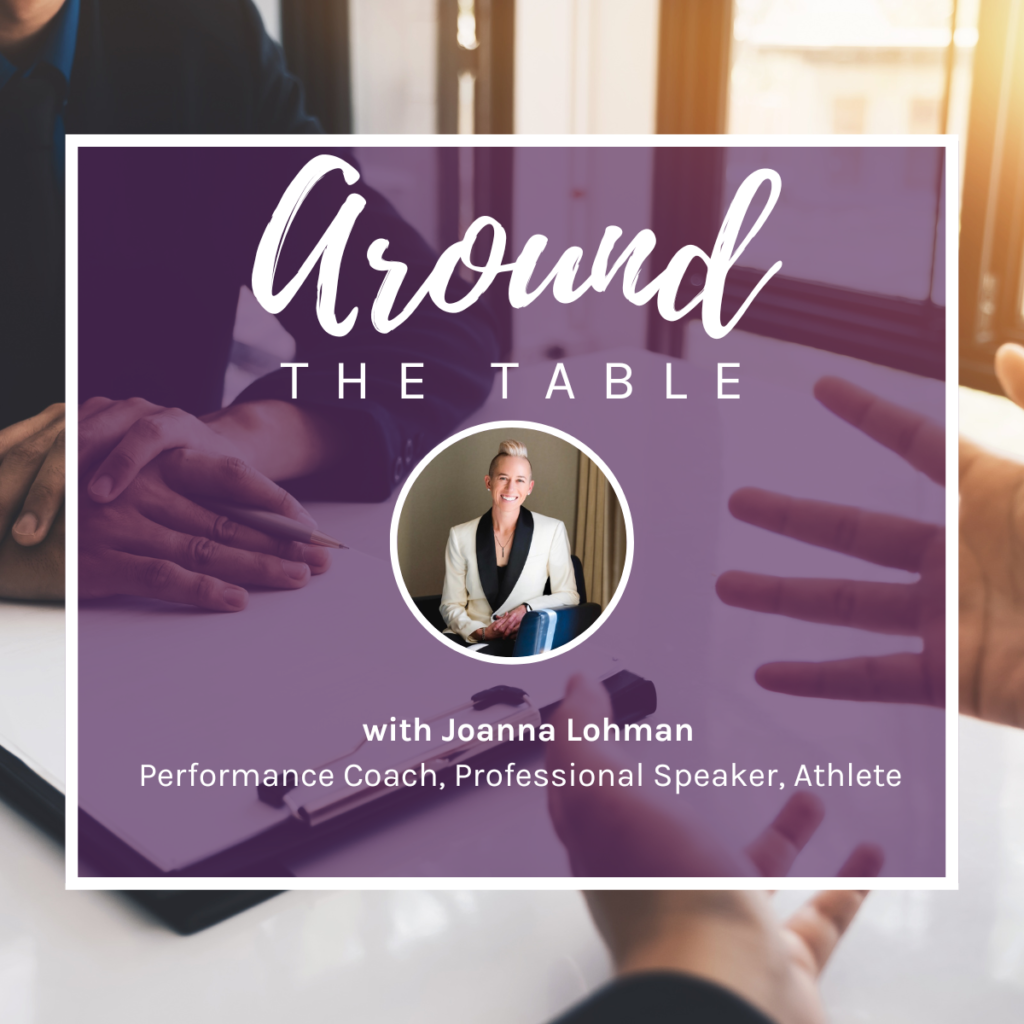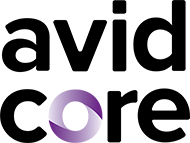Welcome to Around the Table, a regular series where we talk to people in our network and share the incredible work they are doing in their industry. Pull up a chair and join us for conversation and connection.

Name: Joanna Lohman
Occupation: Performance Coach, Professional Speaker, Athlete
Where to Find You: joannalohman.com, Facebook, Instagram, Twitter
What are the most recent projects you’ve been involved in?
My mental performance piece is growing significantly. I just announced that I will be the mental performance coach for the George Mason University women’s soccer team coming up in the fall. With the professional speaking piece of it, I would say those two are the ones that I’m growing into more. I would like to transition a bit more off the soccer field into more of the mindset, speaking and boardroom type of lifestyle.
You’ve been on so many different stages, platforms and fields. What has been your favorite experience?
I think it must be playing for the Washington Spirit, because it’s my hometown team and it was at a point in my career where I was desperate for change. My 2014 season was so hard. I was playing for a coach who was an absolute monster at the Boston Breakers. I can count on one hand the number of times he should have been fired for what he said, and I wrote about it in my book. At that point I was engaged for a second time which was falling apart, so I was at a dark place in my life. Coming back to play for the Spirit, I felt like it reinvigorated my career. I felt safe to step even more into my authenticity. That’s when I started to cut patterns into my hair and express a more masculine side of my gender. I was starting to discover how I felt beautiful, so that translated to my performance on the field. I can remember feeling so happy, and almost being terrified because of how happy I was and knowing that these emotions are fleeting. It was a time in my career where I was playing the most minutes on the field, as my authentic self, in front of people I loved – I felt incredibly fulfilled.
You wear multiple hats and juggle so many responsibilities. How do you manage everything?
It can be challenging. One reason I’m proud of myself is that I’ve tried to stay true to what makes me happy. I’ve been offered jobs working for different companies, but I’ve always bet on myself that I could do it. Growing up, I would tell my parents that I wanted to get paid to be me, and my parents would laugh at me and say that it was very ambitious. I’m following what sets my soul on fire, and people want to hear from me about that. It’s tough juggling it. I have a schedule book that I write everything in, and then it’s just learning when to say no, when to say yes, and how to protect my own mental health.
Where is Joanna going to be in five years?
I will continue to be a leadership and performance coach for athletes, individuals, and organizations. I will be working heavily with Limitless Minds, a company founded by Russell Wilson who I work with now. Through these avenues, I will dive deeper into the mental, social, and physical development of youth athletes. I have plans to release an article in the next month with my analysis on what’s wrong with the youth sports system in America. I want to be the antidote to what I think is somewhat of a runaway train, where the kids are suffering due to a broken system.
You’ve talked about your Diversity, Equity and Inclusion work, and you’ve worked to create safe spaces and such. How did you make the transition from soccer to that work specifically?
I came out at the age of 21 after being engaged to a man, so my coming out transition had its own challenges. I was one the first “out” professional soccer players when it was not common to speak your truth. Even so, I felt extremely natural as a queer advocate. I got daily feedback from fans about how important it was and how much representation mattered for them. I kept getting these little bits of positive reinforcement. I felt privileged to be in that position and it reinforced my own personal journey of transitioning from the straight, long-haired Jo to the more gender androgynous, mohawked lesbian that I am now. What a beautiful thing to help other people feel more comfortable in their own skin.
I think for me, authenticity is one of the most important values in my life. I often believe that if you are your authentic self then you will be your best self, and that’s what we talk about in my book “Raising Tomorrow’s Champions.” I really believe that one of my missions on this planet is to help expand the definition of what a woman can look like. When people look at me, and I get misgendered in bathrooms and locker rooms, I can calmly look them in the eye and say, “I’m a woman,” hopefully making the path a little bit smoother for whoever walks behind me. It’s important to me to break stereotypes of gender and sexual orientation, and to push boundaries imposed by society.
What’s some of the best advice you’ve received in your career?
“You can be so much more than what society tells you.” When I think back to my own journey, I felt so boxed in. Sexual orientation had one option and that was straight; for gender, you always lived on the binary. I was someone who was a huge tomboy, so I sat smack dab in the middle. I didn’t know being gay was an option. It took me 21, 30, 40 years of my life to truly find that authenticity because I didn’t have those options, and no one told me I could be more than what I was shown. That representation matters for kids. It helps them to understand options for identity. When you feel forced to be someone you are not, then you’re not going to thrive.
With the instability of soccer inherent to the league’s structure, what were your biggest challenges throughout your career, and how did you overcome them?
That’s such a great question. A couple of situations stick out to me. I tore my ACL in my 2017 season, and it was supposed to be the best season of my life. The year prior I was the second leading goal scorer and started 18 of 21 games for a team that made it to the championship game. I was also 34 years old, so when I went down with a season-ending injury, I was heartbroken, and I was afraid my whole career was over. Talk about an overnight life shift – it was a huge piece of adversity that I had to overcome.
When I look back on the injury, I say that it was one of the most beautiful things to ever happen to me. It helped me to expand my own identity because so many of us wrap our sense of self around the one thing that we do. When I tore my ACL I couldn’t play soccer, so I was forced to figure out who I was outside of the game. That led me to be a part of a documentary called “Resisterhood,” I was able to go to my first ever Pride parade, and I realized I had a great deal to contribute to the world off the field of soccer. That period of exploration made it easier for me to walk away from the game and retire because I saw myself as a whole human, as opposed to just an athlete.
The second biggest challenge in my life is simply waking up each day and striving to be my authentic self in a world that’s trying to make me someone else. When I get misgendered, it’s hard to not mentally fall down a shame spiral. When you face a considerable amount of resistance to the way you live your life, there can be doubts. I am reminded of the quote from Aristotle: “To avoid criticism, say nothing, do nothing, be nothing.” I want to be someone who is unafraid to face criticism because my actions will elicit resistance. I have to push boundaries and feel uncomfortable to achieve fulfillment.
In your work addressing equal pay issues, gender adversity and everything that comes along with that, are there any specific lessons that you’ve gathered?
It is important we do not become complacent. Meaning, we must never stop advocating and fighting for women’s rights, equality, racial, and social justice. It’s going to take generations for the culture to change and for the laws to change. If you look at it too broadly it feels overwhelming, but just do something small every day. It took the U.S. Woman’s National Team since 1985, the first iteration of the squad, to finally receive equal pay. That is 35 years of women who were willing to really sacrifice their own careers for the sake of future generations. Through their story, it is clear we are most powerful when we collectively fight and do it consistently over time.
As a positive impact coach, what is the most impactful inspirational quote or words of wisdom that resonates with you?
I always think of a quote from Steve Prefontaine, “To give anything less than your best is to sacrifice the gift.” I truly believe that each one of us has been given some sort of gift and the world needs that gift. I hope this encourages people to embrace their authenticity and speak their truth into the world.
When you’re not working what are some of your hobbies?
I love to play with my dog Dewey. We love to go hiking and swimming. I also love going out to dinner and spending time with my wife. My wife and I are expecting our first child at the end of December, so life is about to change but in a really good way. My family is also incredibly supportive, and I cherish every moment I get to spend with them.
If we were literally around the table right now, then what food would you have brought to share?
My wife is Iraqi, and I consider her to be a great cook. She inspires many of our food adventures and in her and her families honor, I’d bring an Iraqi dish called maqluba. It literally translates to “upside down.” You cook a huge pot of rice, chicken, eggplant, and peppers, and then once it’s finished, you artfully flip it upside down (it can be tricky!). If done well, it’s a beautiful mound of slow cooked delicious ingredients and spices. YUM!
